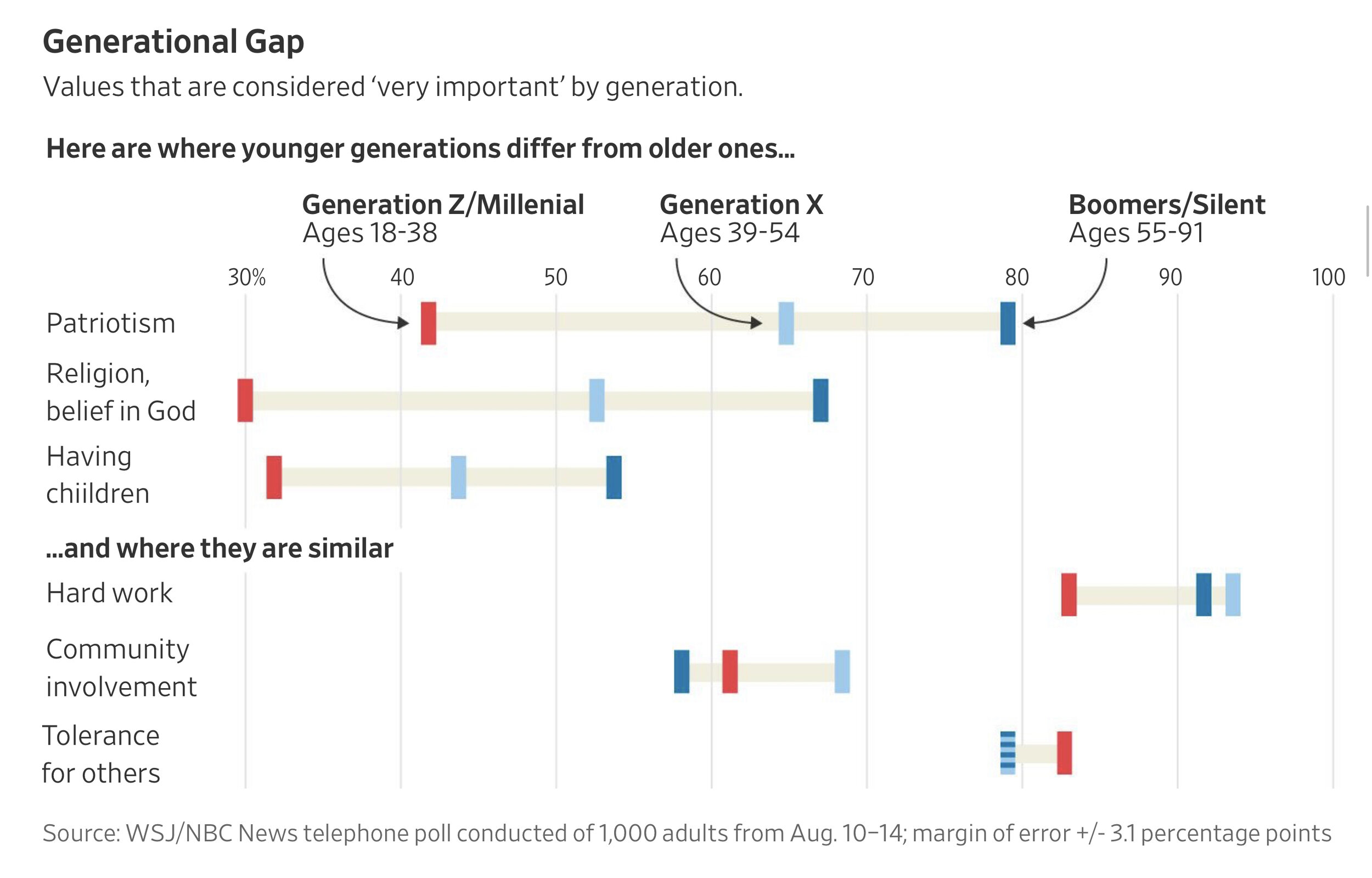How Shifting Values Will Affect Our Schools
/The Wall Street Journal recently reported:
that the values that Americans say define the national character are changing, as younger generations rate patriotism, religion and having children as less important to them than did young people two decades ago. Views varied sharply by age. Among people 55 and older, for example, nearly 80% said patriotism was very important, compared with 42% of those ages 18-38—the millennial generation and older members of Gen-Z. Two-thirds of the older group cited religion as very important, compared with fewer than one-third of the younger group. 1
Lower birth-rates and the devaluing of religion have long term consequences for enrollment and the market demand for a specifically Christian education. While this survey does not measure differences between Christian and non-Christian values, based on other research and data I’ve reviewed, younger generations of Christians are following these cultural trends.
The Leadership Response
Look over the horizon
The responsibility of the Christian school leader is to look over the horizon to see what is coming and to prepare his or her school accordingly. Here are a few practical suggestions on how to prepare our schools for the changes ahead so that we not merely survive, but thrive.
Adjust Your Marketing and Message Focus but Never Your Mission
If the values of our market are changing then our message needs to appeal to those values so long as we never compromise our mission. Adjusting the language and focus of our messaging is not compromise, it is smart. In fact, Paul did much the same when it came to sharing the Gospel.
For though I am free from all, I have made myself a servant to all, that I might win more of them. To the Jews I became as a Jew, in order to win Jews. To those under the law I became as one under the law (though not being myself under the law) that I might win those under the law. To those outside the law I became as one outside the law (not being outside the law of God but under the law of Christ) that I might win those outside the law. To the weak I became weak, that I might win the weak. I have become all things to all people, that by all means I might save some. I do it all for the sake of the gospel, that I may share with them in its blessings. (1 Corinthians 9:19–23)
Paul never compromised the Gospel but he did adapt his language and focus to his audience. We must do the same for a new generation.
Our communications and marketing should be meaningful to younger parents so that once enrolled in our school “we can share with them the blessings” of a Christian education. Once they experience the true blessing of an education focused on Christ and biblical truth in every subject and program they will grow in their understanding and appreciation for the true value of Christian education. Their children will never experience this blessing unless we get them in the door first. We never manipulate but we should motivate by appealing to their interests and values with integrity but without compromising our mission.
For example, if the primary motivation of Millennial parents for the education of their children is academic preparation and social, emotional, and physical safety then our marketing and messaging should target these felt needs while simultaneously communicating the school’s Christian mission in language that younger parents will understand and appreciate.
Don’t Confuse Principles with Practices
We must constantly assess our policies, practices and programs and adjust them as needed to meet the expectations of modern parents. I have a “formula” that guides my thinking along these lines: Immutable Principles + Innovative Practices = Faithfulness and Fruitfulness. Immutable principles are things like our commitment to biblical truth. Immutable principles are just that, immutable. They are just as valid 100 years from now as they are today. Innovative practices, on the other hand, can cover everything from adding, eliminating, or revising policies, programs, and more that better meet the needs of a new generation of students and the expectations of the modern parent. Practices must be changed if we are to be relevant to each new generation.
When we adhere to immutable principles we remain faithful and avoid mission drift. When we are innovative to appeal to the changing values and needs of modern parents we will be fruitful as evidenced by enrollment, retention rates, student spiritual and academic growth, and by many other measures.
Our difficulty is that we have a habit of elevating our long-standing practices and programs to the level of immutable principles. This is a mistake that over the long-term will jeopardize our school’s viability. We must be humble and rigorous in distinguishing between principles and practices. We must be rigorous in upholding the former and equally rigorous in our willingness to change the latter as the market requires.
Questions to Ask Yourself or your Leadership Team
Determining whether a message, a policy, or a program is an immutable principle or only a well-established practice is difficult. There are a lot of reasons for the difficulty. A policy may be considered a “sacred cow” even though there is nothing particularly sacred about it. It is difficult to make changes because people don’t like change, they don’t like to “have their cheese moved.” Sometimes we have implemented policies and programs because we prefer them and they are convenient for us even though changing them or even eliminating them would not violate an immutable principle.
To help distinguish between an immutable principle and a mutable message, policy, practice, or program, ask yourself or your leadership team the following questions.
Is this policy in and of itself an immutable principle that if changed would violate any part of God’s word? For example, for a Christian school, modeling and integrating biblical truth throughout the program is immutable because it is the core of the school’s biblical mandate (Deut. 6, 2 Cor. 10:5, Rom. 12:1-2). On the other hand, the frequency of chapel services or even having chapels are not immutable principles. They may support the immutable mission of the school but in and of themselves, changing or eliminating a weekly chapel is not a violation of an immutable principle.
Is it time to replace a program with another one more relevant for preparing students for the world of connected devices and artificial intelligence? What programs, activities, and clubs should we eliminate? What should be added?
Is it time to change the language and focus of our marketing and messaging? Do we need to place greater emphasis on our academic, athletic and arts programs as well as our commitment to the physical, emotional and social safety of our students? Do we need to simplify our language so that a less biblically literate generation can better understand our mission?
Is it time to reassess our admissions criteria?
Should we anticipate a new normal regarding the size of our school in view of decreasing birth rates and adjust our staffing and programs accordingly?
Should we reconsider our goals and criteria for setting tuition levels?
Is it time to reassess the organizational structure and staffing levels of the school?
Should we consider a new school schedule and the length of the school year?
Can we create a new market for our educational services?
These are difficult questions. Our communities will have strong feelings about these matters.
But, we must face these and other questions in view of changing values and expectations even among Christian parents. Parents have changed. The education market is also changing. What was highly valued by a prior generation, or by our generation, has changed. We may not like the changes but that is beside the point. The changes have arrived. To thrive as Christian schools in a changing culture we must be willing to change by adopting innovative practices while remaining rigorously faithful to immutable principles.
Wall Street Journal, August 25, 2019 Americans Have Shifted Dramatically on What Values Matter Most. https://www.wsj.com/articles/americans-have-shifted-dramatically-on-what-values-matter-most-11566738001 ↩︎


